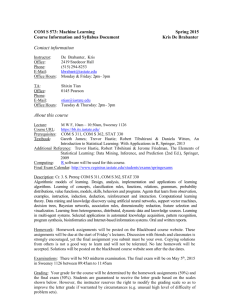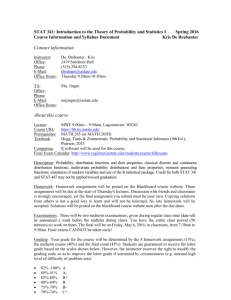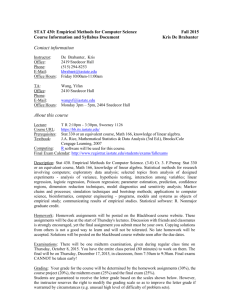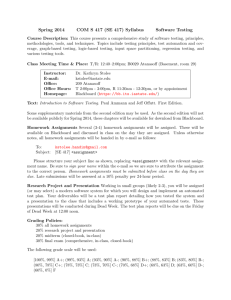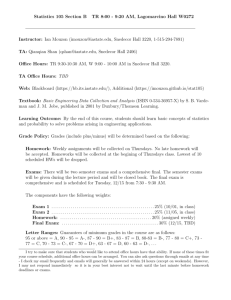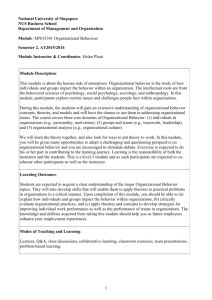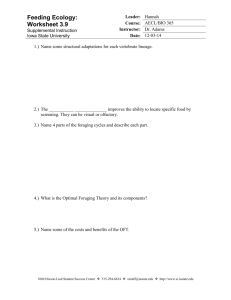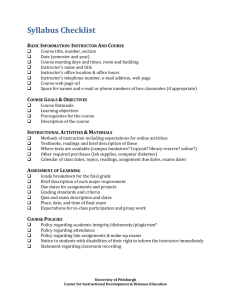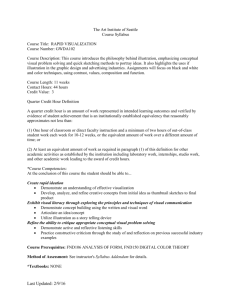BCB 570_2125005_Dickerson_S15
advertisement
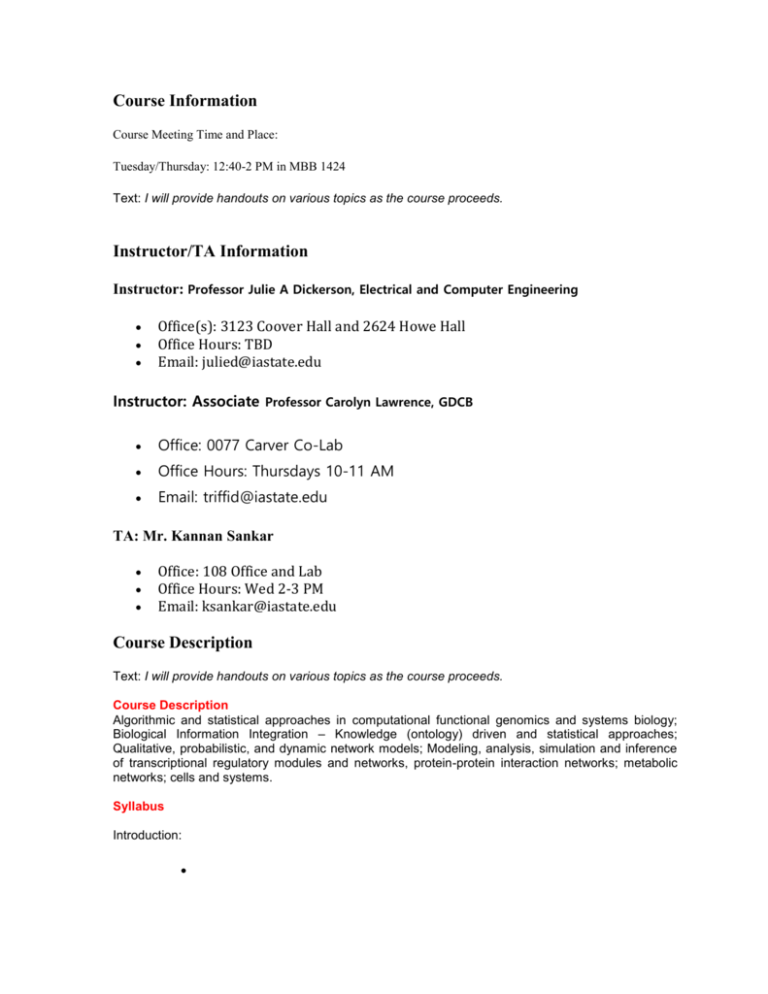
Course Information Course Meeting Time and Place: Tuesday/Thursday: 12:40-2 PM in MBB 1424 Text: I will provide handouts on various topics as the course proceeds. Instructor/TA Information Instructor: Professor Julie A Dickerson, Electrical and Computer Engineering Office(s): 3123 Coover Hall and 2624 Howe Hall Office Hours: TBD Email: julied@iastate.edu Instructor: Associate Professor Carolyn Lawrence, GDCB Office: 0077 Carver Co-Lab Office Hours: Thursdays 10-11 AM Email: triffid@iastate.edu TA: Mr. Kannan Sankar Office: 108 Office and Lab Office Hours: Wed 2-3 PM Email: ksankar@iastate.edu Course Description Text: I will provide handouts on various topics as the course proceeds. Course Description Algorithmic and statistical approaches in computational functional genomics and systems biology; Biological Information Integration – Knowledge (ontology) driven and statistical approaches; Qualitative, probabilistic, and dynamic network models; Modeling, analysis, simulation and inference of transcriptional regulatory modules and networks, protein-protein interaction networks; metabolic networks; cells and systems. Syllabus Introduction: o o What is systems biology? From parts to interactions to wholes; Data integration, predictive model construction, simulation and model-based prediction, model-driven experimentation, bridging levels of abstraction. What is a (mathematical or computational) model? What are models good for? How can we construct models? How can we evaluate models? Networks o o o o o o o o Introduction to networks and network types Finding structure in networks Clustering in networks Association networks, correlation networks, hypergraph models Analysis – module identification (spectral clustering), comparative analysis Inferring or building networks Network comparison Network Visualization Modeling Gene Expression and Gene expression data analysis: Gene expression data acquisition Microarrays and RNAseq Data and Standards Tests for differential expression, multiple testing Cluster analysis – hierarchical clustering, SOM, k-means, PCA, how many clusters? Modules of gene expression (network motifs) Classification based on gene expression Models of genetic networks Modeling and analysis of protein-protein networks Protein-protein interaction data acquisition Data and Standards Metabolic Networks and Pathways Integrating networks Modeling metabolism: Metabolomics, metabolic flux Data and standards Differential, difference, and stochastic equations Enzyme Kinetics and thermodynamics Metabolic networks Metabolic control analysis Steady-state models Whole genome models Modeling Signal Transduction: Intracellular communication Receptor-ligand interaction Structural components of signaling pathways Example pathways – MAP-Kinase, JAK-Stat Dynamic regulatory features Data and Standards Pathway Databases and Pathway Models Modeling and analysis. Integrative and multi-scale modelling What and why? Data integration o Sources Model (ontology)-driven integration – ontologies, mappings, database federation Graph-theoretic methods Probabilistic methods Fuzzy methods Multi-scale modeling Grading and Dead Week Grading: (Preliminary) Homework Assignments 40% Projects on data integration and large-scale network analysis (40%) Case Studies from literature and in-class discussion (20%) Modeling/Computational/Visualization Tools: You are expected to download and install these packages onto your laptops so that we may run simulations and models in class. Matlab: ISU student download R: www.r-project.org Cytoscape: Cytoscape.org Dead Week: This class follows the Iowa State University Dead Week policy as noted in section 10.6.4 of the Faculty Handbook http://www.provost.iastate.edu/resources/facultyhandbook. There will be a homework assignment and student presentations due during Dead Week. Course Policies Disability Accomodation: Iowa State University complies with the Americans with Disabilities Act and Sect 504 of the Rehabilitation Act. If you have a documented disability and anticipate needing accommodations in this course, please make arrangements to meet with Professor Dickerson as soon as you become aware of your need. Retroactive request for accommodations will not be honored. Please have the Disability Resources (Disability Resources Office) complete a SAAR form verifying your disability and specifying the accommodations you will need for this course. You will need to present this form to Professor Dickerson. Harassment and Discrimination: Iowa State University strives to maintain our campus as a place of work and study for faculty, staff, and students that is free of all forms of prohibited discrimination and harassment based upon race, ethnicity, sex (including sexual assault), pregnancy, color, religion, national origin, physical or mental disability, age, marital status, sexual orientation, gender identity, genetic information, or status as a U.S. veteran. Any student who has concerns about such behavior should contact his/her instructor, Student Assistance at 515-294-1020 or email dso-sas@iastate.edu, or the Office of Equal Opportunity and Compliance at 515-294-7612. Religious Accommodation: If an academic or work requirement conflicts with your religious practices and/or observances, you may request reasonable accommodations. Your request must be in writing, and your instructor or supervisor will review the request. You or your instructor may also seek assistance from the Dean of Students Office or the Office of Equal Opportunity and Compliance. Academic Misconduct & Integrity: Academic Misconduct in any form is in violation of Iowa State University Student Disciplinary Regulations and will not be tolerated. This includes, but is not limited to: copying or sharing answers on tests or assignments, plagiarism, and having someone else do your academic work. Depending on the act, a student could receive an F grade on the test/assignment, F grade for the course, and could be suspended or expelled from the University. You are expected to practice academic honesty in every aspect of this course and all other courses. Students who engage in academic misconduct are subject to university disciplinary procedures, as well as consequences with regard to this course. See the Conduct Code at www.dso.iastate.edu/ja for more details and a full explanation of the Academic Misconduct policies. Forms of academic dishonesty: o Obtaining unauthorized information. Information is obtained dishonestly, for example, by copying graded homework assignments from another student, by working with another student on a take- o o o home test or homework when not specifically permitted to do so by the instructor, or by looking at your notes or other written work during an examination when not specifically permitted to do so. Tendering of information. Students may not give or sell their work to another person who plans to submit it as his or her own. This includes giving their work to another student to be copied, giving someone answers to exam questions during the exam, taking an exam and discussing its contents with students who will be taking the same exam, or giving or selling a term paper to another student. Misrepresentation. Students misrepresent their work by handing in the work of someone else. The following are examples: purchasing a paper from a term paper service; reproducing another person’s paper (even with modifications) and submitting it as their own; having another student do their computer program or having someone else take their exam. Plagiarism and Academic Dishonesty Plagiarism is the act of representing directly or indirectly another person’s work as your own. It can involve presenting someone’s speech, wholly or partially, as yours; quoting without acknowledging the true source of the quoted material; copying and handing in another person’s work with your name on it; and similar infractions. Even indirect quotations, paraphrasing, etc., can be considered plagiarism unless sources are properly cited. Plagiarism will not be tolerated, and students could receive an F grade on the test/assignment or an F grade for the course. A useful link to understanding plagiarism, the consequences of plagiarism, and best practices for avoiding plagiarism is available at: http://instr.iastate.libguides.com/content.php?pid=10314. Contact Information: If you are experiencing, or have experienced, a problem with any of the above issues, email academicissues@iastate.edu.
